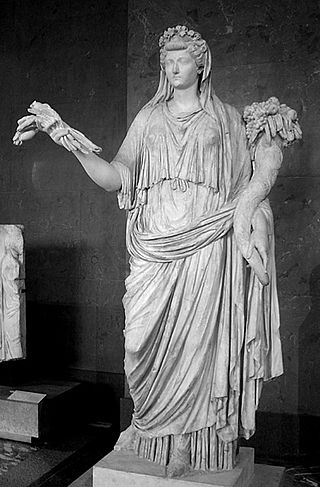See also
- Joanne (given name)
- Jo-Anna, given name
Jo-Anne, Jo Anne, Jo-Ann, JoAnn, JoAnne, and Jo Ann is a feminine given name derived from the name Joanne. Unlike the name Joanne, which originates from the Greek Joanna, Jo-Anne is a compound name consisting of the names Jo and Anne.
Notable persons with that name include:

Lucy is an English feminine given name derived from the Latin masculine given name Lucius with the meaning as of light. Alternative spellings are Luci, Luce, Lucie, Lucia, and Luzia.

Anne, alternatively spelled Ann, is a form of the Latin female given name Anna. This in turn is a representation of the Hebrew Hannah, which means 'favour' or 'grace'. Related names include Annie.
Joanna is a feminine given name deriving from Koinē Greek: Ἰωάννα, romanized: Iōanna from Hebrew: יוֹחָנָה, romanized: Yôḥānāh, lit. 'God is gracious'. Variants in English include Joan, Joann, Joanne, and Johanna. Other forms of the name in English are Jan, Jane, Janet, Janice, Jean, and Jeanne.
Joanne is a female name derived from the Greek name Joanna via the French Johanne.
Dobson is an English and Scottish surname.
Benson is a common patronymic surname of English origin meaning "son of Ben". Benson is uncommon as a first name, but quite common as a surname in English speaking countries.

Patricia is a gender neutral given name of Latin origin. Derived from the Latin word patrician, meaning "noble"; it is the feminine form of the masculine given name Patrick. The name Patricia was the second most common female name in the United States according to the 1990 US Census. Another well-known variant of this is "Patrice".
Arnold is a German and English surname. Notable people with the surname include:

Hannah also spelled Hanna, Hana, Hanah, or Chana, is a feminine given name of Hebrew origin. It is derived from the root ḥ-n-n, meaning "favour" or "grace"; A Dictionary of First Names attributes the name to a word meaning 'He (God) has favoured me with a child'. Anne, Ana, Ann, and other variants of the name derive from the Hellenized Hebrew: Anna.
Carson is a surname of Scottish and Irish origin.
Fraser is a Scottish surname, connected to the Clans Fraser and Fraser of Lovat. It is most commonly found in the United Kingdom, Canada, the United States, Australia, and New Zealand.

Anna is a feminine given name, the Latin form of the Greek: Ἄννα and the Hebrew name Hannah, meaning "favour" or "grace".

Ward is a surname of either Old English or Old Gaelic origin, common in English-speaking countries.

Kelly is a surname in the English language. The name has numerous origins, most notably from the Ui Maine. In some cases it is derived from toponyms located in Ireland and Great Britain, in other cases it is derived from patronyms in the Irish language.

Shirley is a given name and a surname originating from the English place-name Shirley, which is derived from the Old English elements scire ("shire") or scīr and lēah. The name makes reference to the open space where the moot was held. The surname Shirley became established as a female given name in 1849 due to its use in Charlotte Brontë's novel Shirley, in which the character explains that her parents had intended the family surname for a son. It was further popularized in 1851–52 by its pseudonymous use by California Gold Rush writer Louise Amelia Knapp Smith Clappe. It was eventually brought to its highest popularity, in the 1930s, by the fame of child star Shirley Temple.
Russell, also Rosel, Rousel, Russel or Rossell. The origin of the name has historically been subject to disagreement, with two distinct origins proposed. Early genealogists traced the Russel/Russell family of Kingston Russel from Anglo-Norman landholders bearing the toponymic surname 'de Rosel' or 'du Rozel', deriving from Rosel, Calvados, Normandy. However, J. Horace Round observed that these flawed pedigrees erroneously linked toponymic-bearing men with unrelated men who instead bore the Anglo-Norman nickname rus[s]el, given men with red hair. This nickname was a diminutive of the Norman-French rus, meaning 'red', and was also an archaic name for the red fox, which in turn borrowed from Old Norse rossel, "red-haired, from Old Norse ros "red hair color" and the suffix -el. Round concluded "there is no reason to suppose that the surname Russell was territorial at all," and surname dictionaries have preferred to derive the surname from the nickname. Dictionaries also state that the English name Rufus originally meant "red haired".
Annie is the diminutive of feminine given names such as Anna, Ann, Anne, Annette, Anita, Andrea, Angela, Anastasia and other variations. It may refer to:
Jo is a given name, often a short form (hypocorism) of Joanna, Joanne, Joseph, Josephine, George, etc. Notable people with the name include:
Hartley is a surname. Notable people with the surname include:
Gwynn, Gwynne, Guinn or Gwyn, are given names meaning "white" or/and "blessed" in Welsh and Cornish.